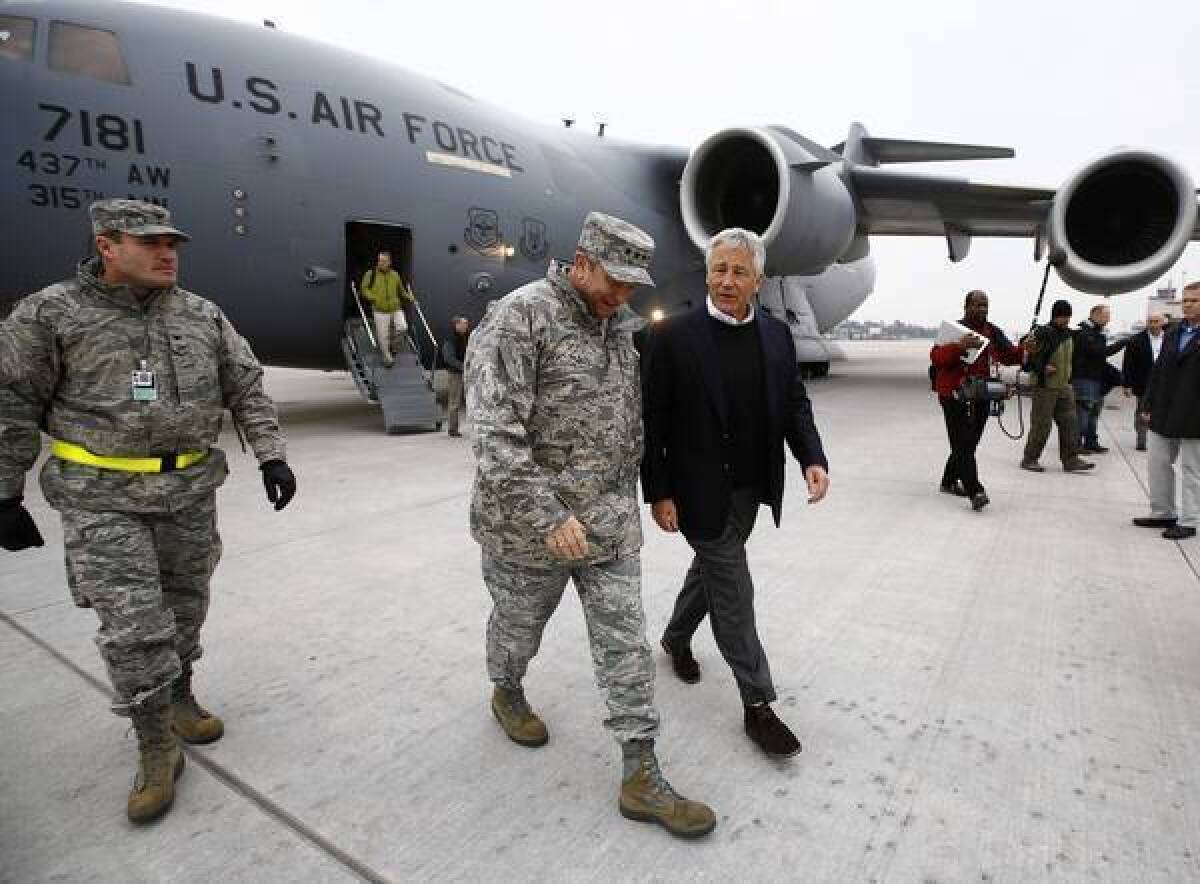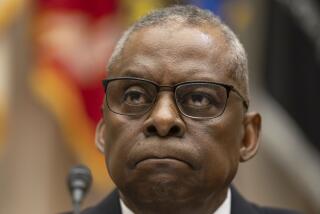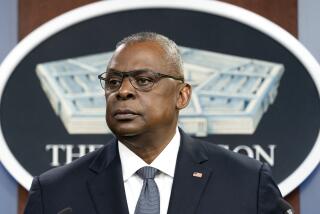New Pentagon chief Chuck Hagel tries to find his balance

RAMSTEIN AIR BASE, Germany — On his way home from Afghanistan, Defense Secretary Chuck Hagel had planned to stop Monday at the Landstuhl Regional Medical Center, the U.S.-run hospital in Germany where thousands of American soldiers wounded in Iraq and Afghanistan have been treated over the last decade.
But the visit was canceled when Hagel’s staff learned no Americans were being treated for combat wounds there now, a military official said. Only three U.S. military personnel have been killed in combat since January, and about 60 have been wounded.
It was a rare bit of good news for Hagel after a disappointing first overseas trip as Pentagon chief — and even that boost quickly faded when an Afghan police officer killed two U.S. troops later Monday, the third insider attack this year.
Overall, Hagel’s three-day visit to Afghanistan was marred by a suicide bombing and security threats in the heart of Kabul, a canceled news conference that was expected to highlight progress in the war, and heated accusations by Afghan President Hamid Karzai that the U.S. military was colluding with the Taliban to prolong the American troop presence.
Even worse, Hagel returns to an in-box full of troubles in Washington. First on the list: how to absorb $47 billion in budget cuts mandated by Congress this year, with more trims to come. His predecessor, Leon E. Panetta, had warned the cuts would devastate America’s military readiness.
Hagel has seemed low-key and at times unsure of himself since he won a bitter Senate confirmation battle Feb. 27. His reaction to his early burdens is tough to gauge, but he has yet to show the sparks that earned him maverick status when he served as a Republican senator from Nebraska who took controversial positions and issued blunt assessments, no matter the consequences.
When pressed for his reaction to Karzai’s claim that the U.S. was working with the Taliban, Hagel said he had told Karzai it wasn’t true. But he voiced not even a gentle protest in public at the incendiary charge that America was selling out an ally it has lost thousands of lives defending for the last 12 years.
“I was once a politician so I can understand the pressures that especially leaders of countries are always under,” Hagel said at a news conference. He said he spoke “clearly and directly” with Karzai. “And I think he understands where we are and where we’ve been and hopefully where we’re going together.”
Aides say Hagel is still acclimating himself to a daunting job. He heads the Pentagon during an unpopular war, gets scrutinized for every public utterance, faces constant demands for decisions, and must meet a grinding schedule of briefings, meetings and public events.
Hagel has not signaled whether he will push to keep a sizable U.S. force in Afghanistan after the end of 2014, as many military commanders hope. Many White House aides think the Pentagon has accomplished all it can in Afghanistan, and are urging the president to reduce the number of troops and bases to minimal levels.
Perhaps his biggest challenge is figuring out how to lead a vast organization at a time of retrenchment. With mandated budget cuts, and the ending of expensive wars in Iraq and Afghanistan, the Pentagon is facing a period of sustained belt-tightening after a decade of ballooning budgets and constant deployments.
To be sure, few Defense secretaries have come to the job with a more compelling background. Hagel enlisted in the Army and fought in Vietnam in 1967 and 1968, where he was wounded twice as an infantry squad leader in the Mekong Delta. He and his younger brother, Tom, who served in the squad, saved each other’s lives on separate occasions. He is the first Defense secretary who remained an enlisted soldier during his military career.
Hagel’s ground-level view in a losing war convinced him to be wary about sending Americans to fight in foreign wars, he has said. Aides say it also left him with an easy camaraderie with enlisted troops that eluded many of his forerunners who never saw combat.
But at Forward Operating Base Fenty, a U.S. base in eastern Afghanistan that Hagel visited Saturday, he mentioned Vietnam only in passing. He seemed uncomfortable talking about his service in a long-ago war to young troops now on the front lines.
“It is true I was in the United States Army in 1968 in Vietnam. I was with the 9th Infantry Division,” he told more than 100 troops, saying nothing more of his wartime experience. The 9th Division no longer exists.
Hagel stayed active in national security debates after he left the Senate in 2009, serving on President Obama’s intelligence oversight board and joining a Washington think tank.
But he was far less prominent than Panetta, who had served as CIA director and presided over the raid that killed Osama bin Laden. Panetta, a back-slapping pol who enjoyed salty language, seemed to quickly master the Pentagon’s culture.
Robert M. Gates, Obama’s first Defense secretary, also had headed the CIA. He later served on the Iraq Study Group, a panel created by Congress to study the Iraq war, giving him a detailed grasp of the conflict’s complexities when he arrived at the Pentagon.
Hagel had not served in a senior role in the executive branch since he was deputy director of the Veterans Administration three decades ago. As a senator, he could expound on the flaws he saw in Iraq and Afghanistan without having direct responsibility for how the Pentagon was run.
Now he does.
More to Read
Sign up for Essential California
The most important California stories and recommendations in your inbox every morning.
You may occasionally receive promotional content from the Los Angeles Times.











